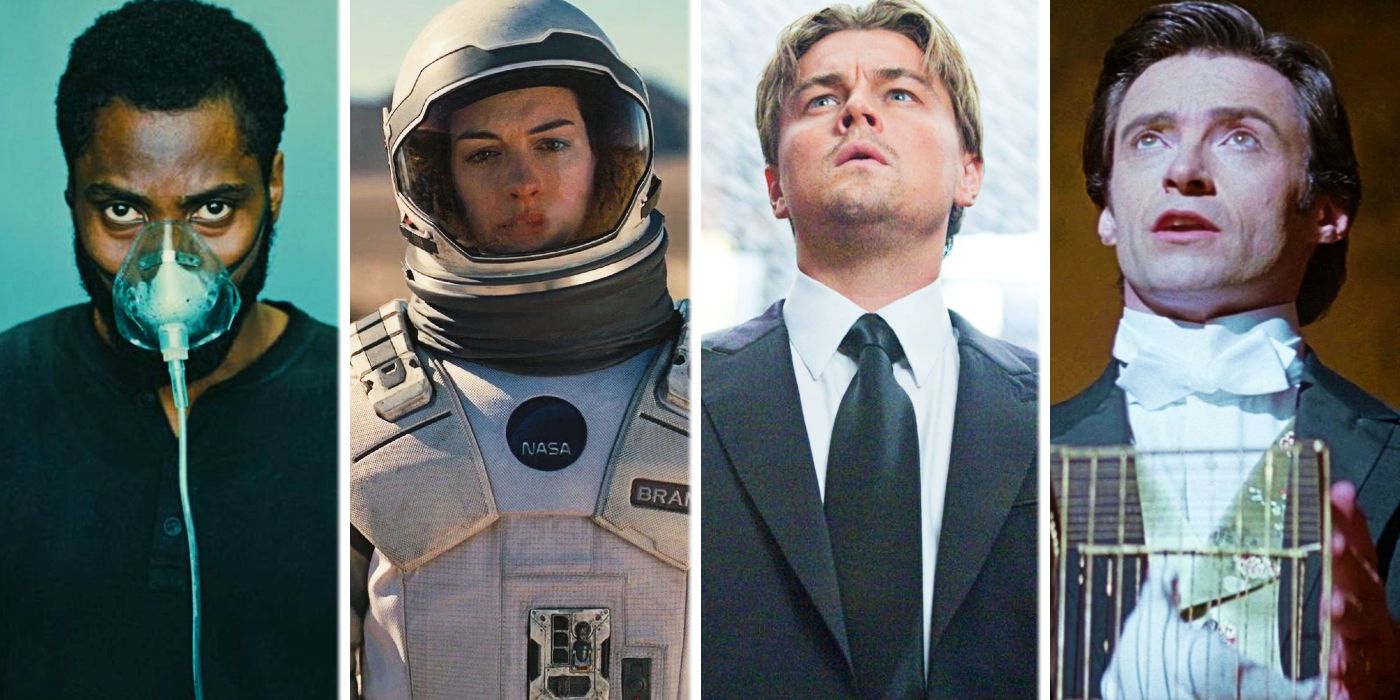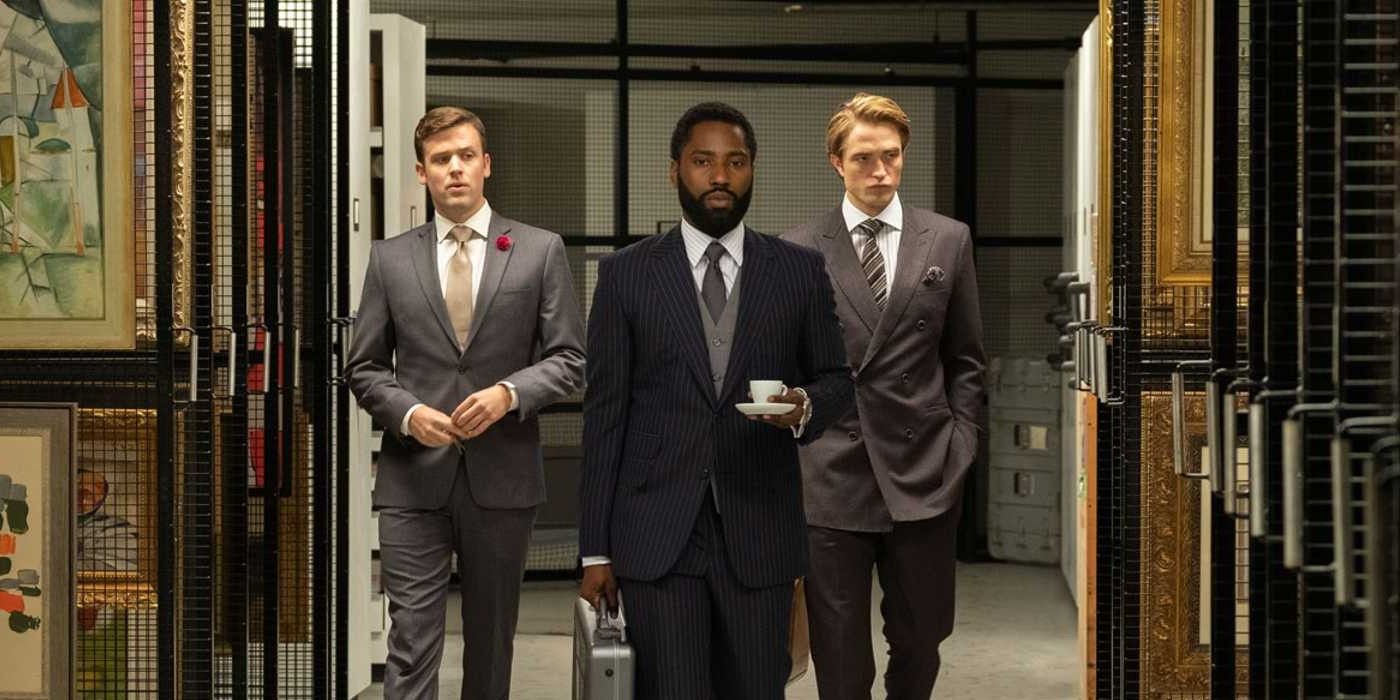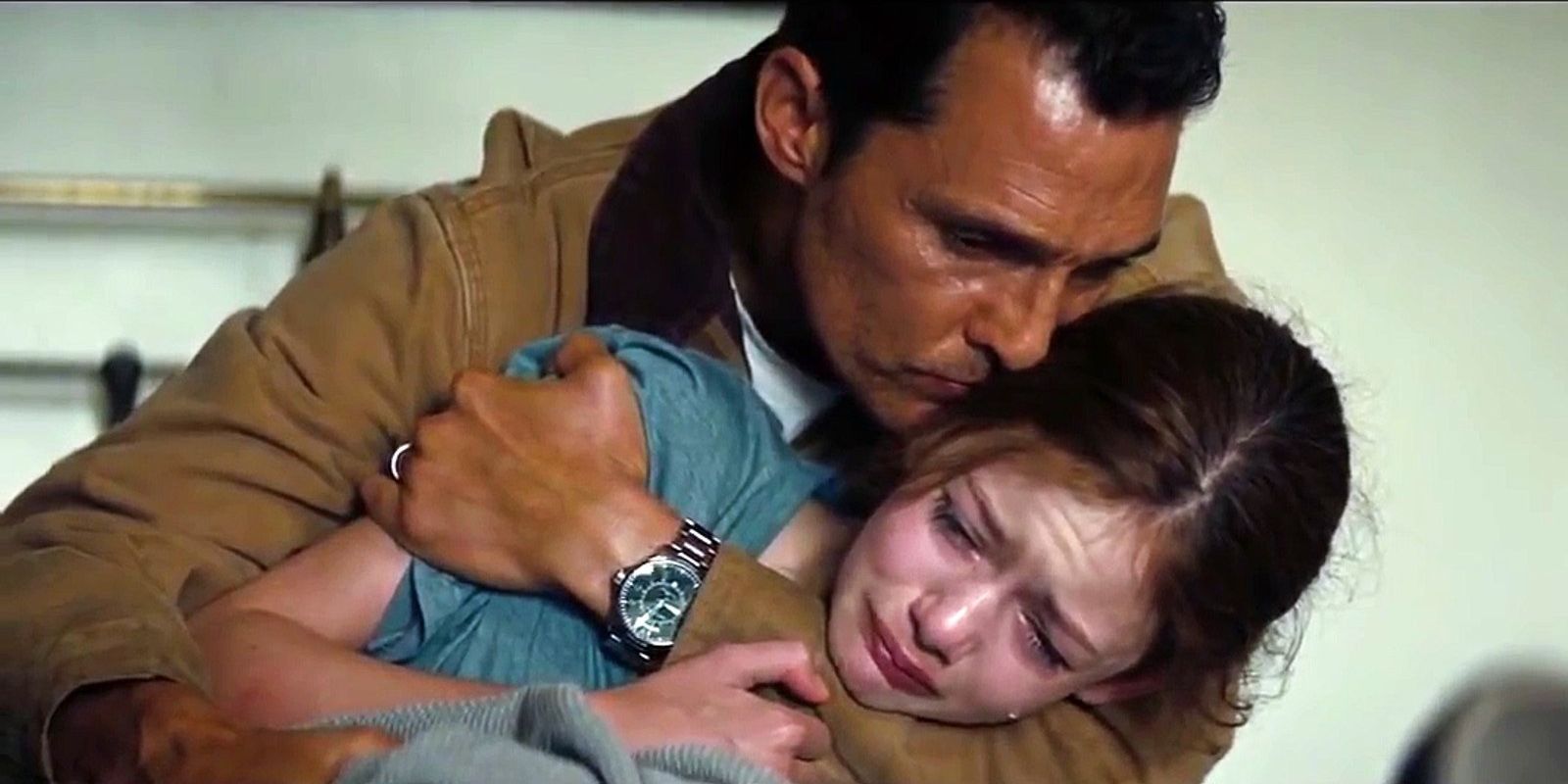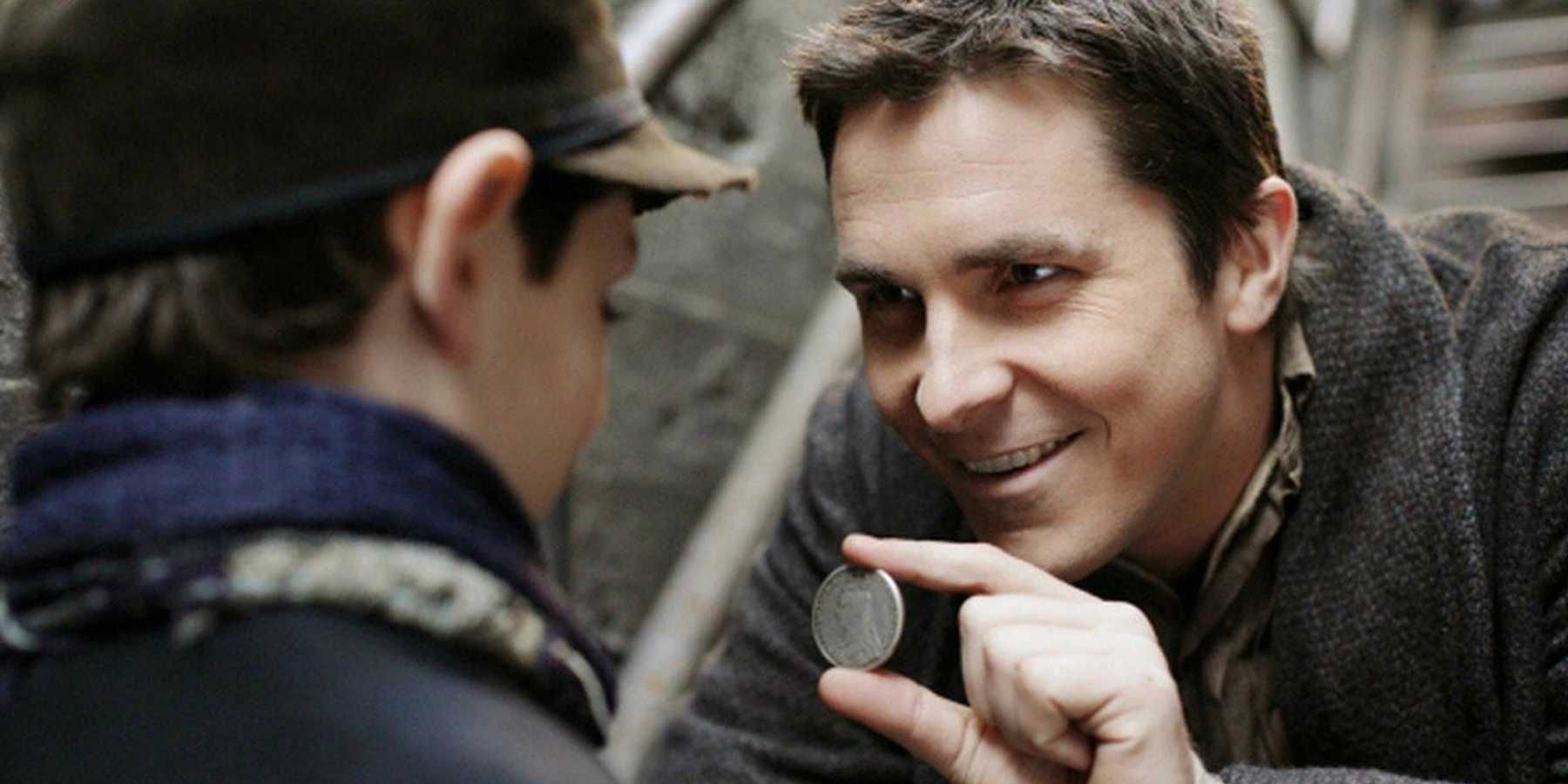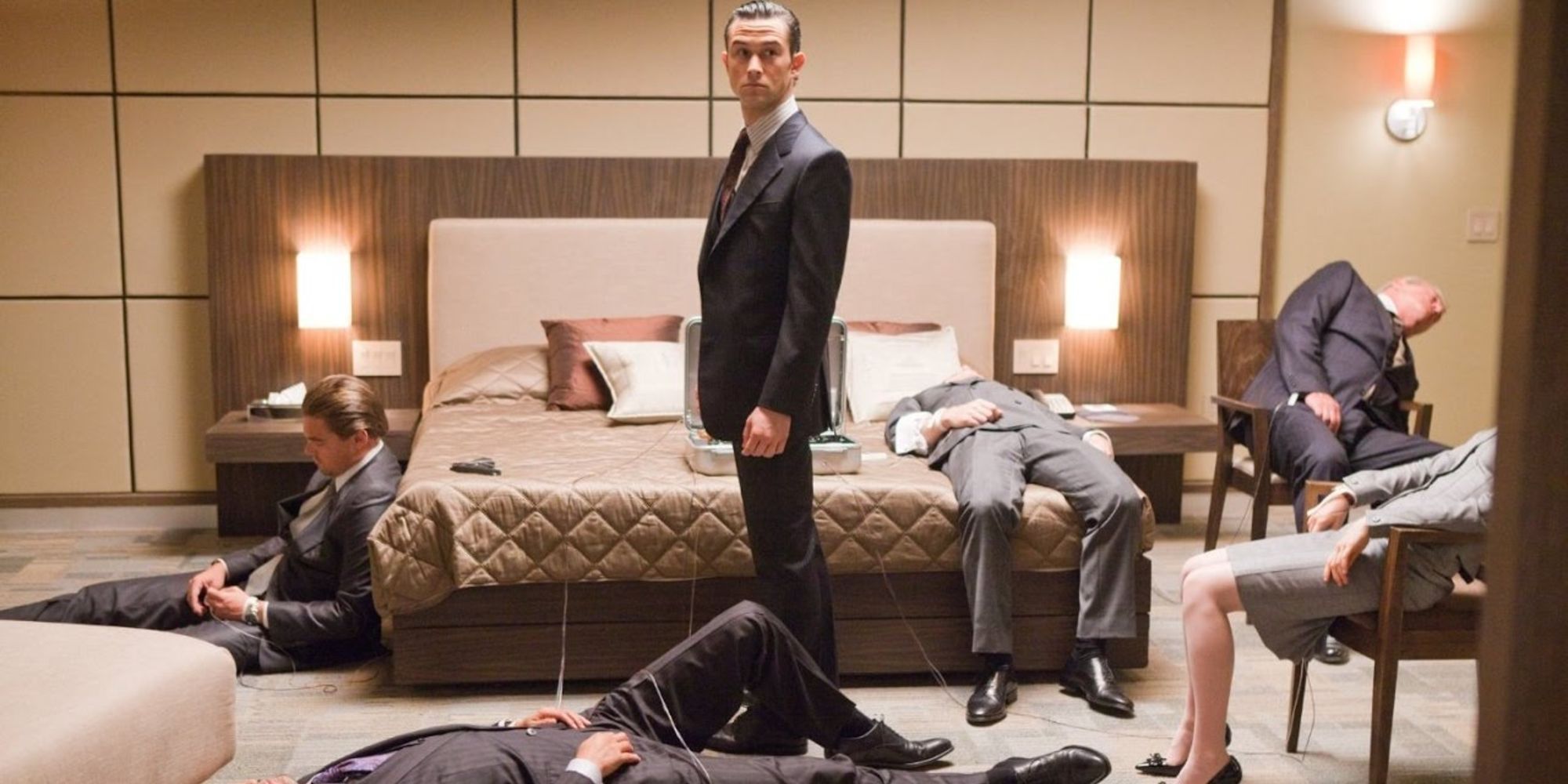Christopher Nolan is one of the leading directors of science fiction working today, but how do his films from the genre rank from worst to best? Of his 11 movies, only four traffic in that area where science and fantasy meet. However, the impact of each of them is so great that the genre has come to define the filmmaker in many ways. Nolan made his feature film debut in 1998 with the crime thriller Following, what followed is largely consumed by his sci-fi works: ambitious, original, simple-hearted but technically-minded films that are unlike anything else mainstream filmmakers are creating today.
From the notorious questions of Inception's ending to the head-scratching confusion of Tenet, Nolan's sci-fi films are laden with exposition but brimming with invention, as convoluted as they are captivating. They're also the singular works of one of the most successful filmmakers working today. Here are Nolan's sci-fi films ranked from worst to best.
4. Tenet (2020)
One of the lone blockbusters to brave the COVID-19 pandemic and release in theaters, Tenet was instantly saddled with baggage it never was meant to bear. It's neither the savior of cinema nor its downfall, but instead simultaneously the most ambitious and slightest film Nolan has made thus far. Much has been made of its incomprehensible plot (something about a secret agent bending time to stop a Russian arms dealer from causing WWIII), as well as its indecipherable dialogue, buried as it is in a sound mix that favors cacophony over clarity.
Indeed, Tenet's screenplay often reads like a neverending instruction manual, its characters thinly-drawn sketches left for actors to fill in. Unfortunately, of the main cast, only Robert Pattinson gives a performance of note, positively dripping with movie star charisma and giving the film the tiniest semblance of a heart amidst all the technical mumbo-jumbo. Elsewhere, Kenneth Branagh hams it up to diminishing returns, and John David Washington just can't tap into the Bond-esque swagger needed to give his cardboard Protagonist any dimensionality. Even Elizabeth Debicki is wasted in a role so poorly written; it's comical.
There's a lot to unpack from repeat viewings, sure, but it's all plot-based, the untangling of the logistical web Nolan has assembled. There's nothing subtextual going on here; at the end of the day, Tenet is a standard spy caper drowned in Nolan's classic tone. What is unimpeachable are the setpieces, brilliantly-staged bits of gee-whiz cinema where buildings explode and reassemble in the blink of an eye and cars chase each other backward on the freeway. The visual effects were awarded an Oscar, but the Academy should have also recognized Hoyte van Hoytema's wonderfully textured cinematography and Ludwig Goransson's haunting score. After all, Tenet is a technical masterwork, even if its opacity can become maddening.
3. Interstellar (2014)
Nolan has forever been open about his love for Stanley Kubrick's 2001: A Space Odyssey, a film that has long been a towering monolith toward which cinema-makers have aspired. With Interstellar, Nolan comes the closest he's gotten in his career to touching the singular beauty of that film. It's not just that it's his longest, nor that it's the only one of his films to actually spend a significant portion in space, but rather that it is the director's most experimental film, as well as his most nakedly emotional. Nolan has often been targeted as a "cold" director, but Interstellar, while capitalizing on a renewed interest in cerebral sci-fi films, is filled with a profound earnestness lacking in his other films.
The story imagines a future where exploration is frowned upon, where NASA has been labeled a fiction, even as the Earth is being choked to death by a dust-soaked blight. "We've forgotten who we are," says Matthew McConaughey's astronaut-turned-farmer Cooper. "Explorers, pioneers; not caretakers." It's a great analogy for the career of a director who has always favored big, adventurous swings.
When Cooper must travel to the outer reaches of space to search for a habitable planet, it gives Nolan carte blanche to explore worlds where waves tower like mountains and black holes lead to the back of one's farmhouse bookcase. The spectacle and technological gobbledegook is hardly the point, though; as usual, Nolan is telling a much simpler story here. Many have thrown criticism at a mid-movie screed by Anne Hathaway about love being a quantifiable measurement across time and space, but to dismiss that monologue is to dismiss the entire film's thesis. At its core, Interstellar's space odyssey is a love story between a father and his daughter.
2. The Prestige (2006)
At the time of its release, The Prestige had to contend with another period magician movie, The Illusionist, and as such, kind of got lost in the shuffle. While its box office pales in comparison to everything the director did post-Batman Begins, it's now perceived by many to be one of the best films in Nolan's entire filmography. It could be that it bizarrely feels his most personal, being as it is the story of people who revel in their ability to trick an audience. The film itself is an act of magic, its best surprise saved for last. The turning wheels and grand designs of his film's screenplays (usually co-written with Jonathan Nolan) are all on display, but this one clicks into place in a way that's chill-inducing, haunting, and as satisfying as the work of any modern-day wizard.
It also helps that it's Nolan's most character-based. There are no technological diatribes or long-winded exposition, so the people can take center stage and not just feel like objects moving through a story. While his treatment of female characters (or at least the ones he allows to live) remains almost medieval, the warring male magicians at the center of this film are two of the most artfully drawn, compelling characters in any of Nolan's oeuvre.
Christian Bale is magnificent as the obsessive craftsman, and Hugh Jackman finds his best role in Robert Angier. An actor who is equally skilled at playing old-fashioned high-stakes melodrama and pure showman bravura, the two sides of his coin have never been as satisfyingly utilized as they are here. There's a lot of campy ridiculousness on display, of course; a mid-movie prank-war between the two men, disguised in different beards, verges on Monty Python. However, The Prestige is largely a hauntingly engaging story, a peek into Nolan's own obsessions, and the only film to feature David Bowie as Nikola Tesla.
1. Inception (2010)
Christopher Nolan is a master of spectacle. He's an aesthetically "cool" filmmaker trading in a vernacular that is decidedly nerdy. His films are haunted by ghost women and filled with handsome men in suits, oftentimes moving robotically through the 3D chessboard he's laid out for them. They're overflowing with exposition, riddled with convoluted technicalities, and yet somehow completely entertaining. As far as contemporary big-budget filmmakers are concerned, Nolan is in a class by himself, and as far as the buzz one gets from one of his sci-fi offerings, Inception is the peak.
Nothing about it should work. It's excessively complicated and overflowing with rules, a good chunk of its screenplay devoted exclusively to the explanation of "what on Earth is even happening?" Yet somehow, aside from the ongoing debate about its ending, its vibe is that of popcorn entertainment, a no-holds-barred thrill ride that mashes up genres with pure movie star swagger. At the time of its release, there was some criticism that Nolan's imagination was limited; his dreamscapes lack the haunted disturbia of David Lynch's or the fanciful surreality of Fellini's. However, that criticism fails to recognize that Christopher Nolan, despite his grand designs and ambition, has always been a populist. Inception is not just his greatest sci-fi film but one of the great pieces of popular entertainment of the 21st century.

